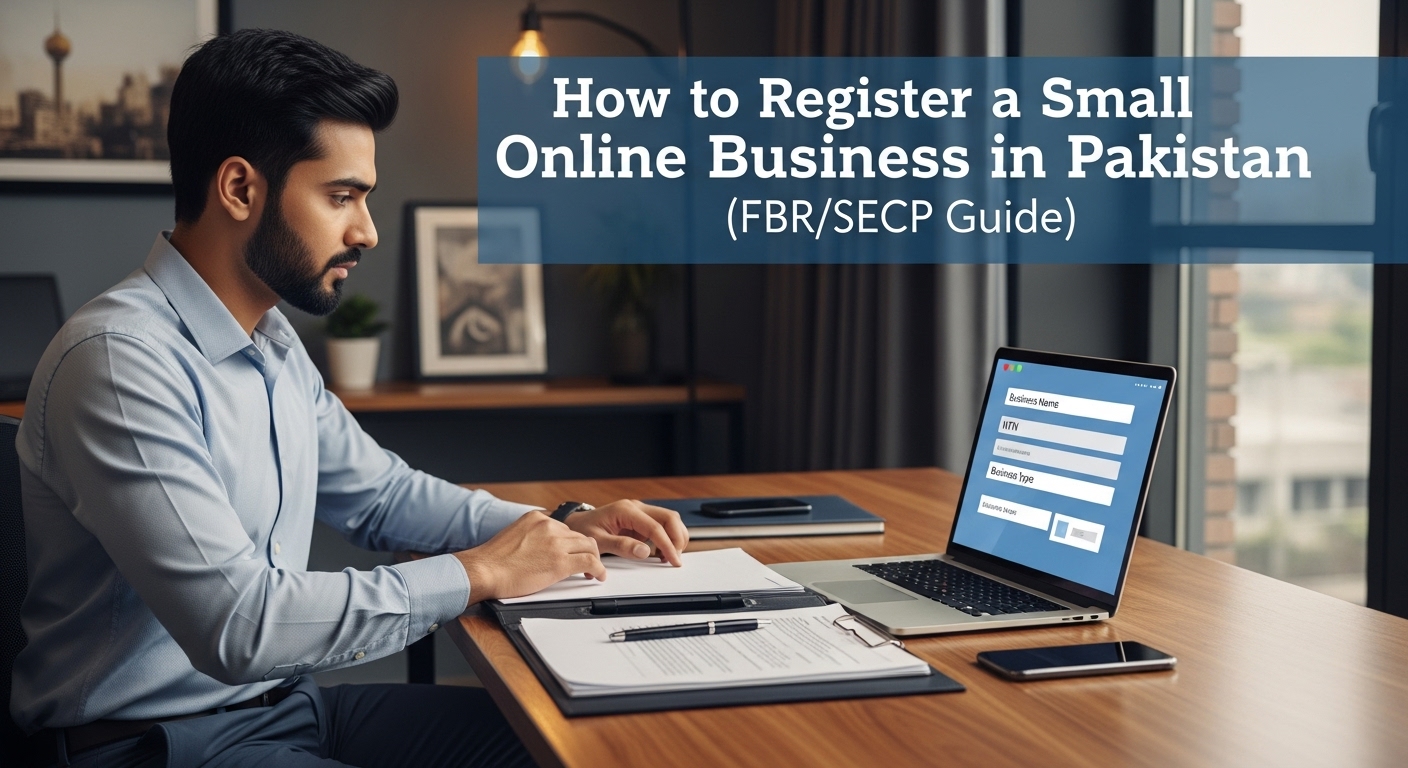Starting an online business in Pakistan is an exciting journey, offering immense potential for growth and reaching customers across the country. However, like any legitimate venture, it requires proper legal registration and compliance. This guide is your complete roadmap for you to successfully register online business with the Federal Board of Revenue (FBR) and, if applicable, the Securities and Exchange Commission of Pakistan (SECP).
Whether you’re a budding entrepreneur selling handmade crafts from home, a seasoned freelancer offering digital services, or planning a full-fledged e-commerce store, this guide will walk you through every step. We’ll demystify the jargon, explain why each step is crucial, and provide practical tips tailored for the Pakistani context.
Why Register Your Online Business?
You might be thinking, “It’s just an online business, do I really need to register?” The answer is a resounding yes! Registering your online business, even if small, provides numerous benefits and helps you avoid future complications.
- Legal Recognition and Credibility: A registered business has a formal identity, which builds trust with customers, suppliers, and potential investors. It makes you look more professional.
- Access to Financial Services: Registration makes it possible to open a dedicated business bank account. This is crucial for separating personal and business finances, simplifying accounting, and applying for loans as you grow.
- Tax Compliance and Benefits: Registering with FBR ensures you meet your legal obligation to pay taxes. Being a registered taxpayer, or “filer,” can lead to benefits like reduced tax rates and easier business transactions.
- Protection and Growth: Formal registration offers legal protection for your business name and operations. It also opens the door to engaging with larger companies and attracting investment.
Step 1: Choose Your Business Structure Wisely
Before you even think about forms or portals, the first crucial decision is to determine the legal structure of your online business. This choice impacts your liability, tax obligations, and administrative burden. In Pakistan, common structures for small online businesses include Sole Proprietorship, Partnership Firm, and Single Member Company (SMC) or Private Limited Company.
Sole Proprietorship
This is the simplest structure, ideal for individual entrepreneurs. The owner and the business are not legally separate.
- Registration: No SECP registration is required. Your individual National Tax Number (NTN) serves as the business’s tax identity. You just need to register your business activity with FBR.
- A common mistake: Failing to separate personal and business finances. Even though you are legally one entity, keeping separate bank accounts is vital for clarity and growth.
Partnership Firm
This structure is for two or more people who agree to share a business’s profits or losses. It’s governed by the Partnership Act of 1932.
- Registration: A partnership is registered with the Registrar of Firms in your district, not SECP. You’ll need a Partnership Deed, a legal document that outlines the terms of your agreement.
- A common mistake: Not having a well-drafted Partnership Deed. This can lead to disputes later on. Make sure it clearly defines profit sharing, responsibilities, and dispute resolution.
Single Member Company (SMC) / Private Limited Company
These are limited liability companies registered with SECP. An SMC is owned by one person, while a Private Limited Company needs at least two directors. The key benefit is limited liability, which protects the owners’ personal assets from business debts.
- Registration: This is the most formal structure and requires registration with SECP. You’ll need to create a Memorandum of Association (MoA) and Articles of Association (AoA). After SECP approval, the company gets its own NTN from FBR.
- A common mistake: Underestimating the ongoing compliance requirements. Companies have stricter reporting rules, so it’s a good idea to seek professional help for setup and compliance.
Local Tip: For most small online businesses just starting in Pakistan, a Sole Proprietorship is the simplest and most cost-effective option. You can always change your structure as the business grows.
Step 2: Obtain Your National Tax Number (NTN) from FBR
Regardless of your chosen business structure, obtaining a National Tax Number (NTN) is a mandatory first step for tax compliance in Pakistan. This number identifies you or your business as a taxpayer with the Federal Board of Revenue (FBR).
What is NTN and Why Do You Need It?
The NTN is essentially your tax identity. For a sole proprietorship, your individual CNIC acts as your NTN once you register as a taxpayer with FBR. For partnerships and companies, a separate NTN is issued for the entity itself. Having an NTN allows you to file income tax returns, participate in the active taxpayer list (ATL), and conduct various business transactions smoothly.
How to Obtain NTN (For Sole Proprietorship/Individual)
This entire process is done online through the FBR IRIS portal.
- Access the FBR IRIS Portal: Go to the official FBR IRIS website.
- Create an Account: If you don’t have one, fill in your personal details. Make sure the mobile number and email you use are registered in your name.
- Fill the Registration Form (Form 181): Log in and go to the “Business” tab. Add your business details, including a name, a relevant business category (like “Retail Trade via Mail Order Houses or Internet”), and your business address (which can be your home address).
- Submit the Form: Click “Submit.” Check your IRIS inbox for any queries from FBR and respond to them quickly.
- Download Your Certificate: Once approved, you’ll get a notification in your inbox. You can then download your NTN Certificate.
How to Obtain NTN (For Partnership Firm and Company)
For Partnership Firms and Companies, the process is slightly different as the NTN is obtained for the entity, not just the individual. You’ll still use the FBR IRIS portal, but you’ll need the firm’s registration certificate (for partnership) or the company’s incorporation certificate (for company) from SECP first.
After registering your partnership firm with the Registrar of Firms or your company with SECP, you will use their respective registration numbers/certificates to apply for the entity’s NTN through the FBR IRIS portal. The process generally mirrors the individual NTN application but requires company/firm-specific details and documents like the MoA/AoA or Partnership Deed, and CNICs of all partners/directors.
Access the IRIS portal, select the appropriate taxpayer type (AOP for partnership, Company for company), and follow the prompts to enter the required information and upload the necessary documents.
Step 3: Consider Sales Tax Registration (STRN)
Not all small online businesses immediately require Sales Tax Registration Number (STRN), but it’s a critical consideration, especially if you sell goods or provide certain taxable services.
Not every small online business needs a Sales Tax Registration Number (STRN) right away, but it is important if you sell goods or provide certain taxable services.
When Is STRN Required?
Generally, if your online business sells taxable goods and has an annual turnover of over PKR 10 million, you are legally required to register for sales tax. However, some specific sectors may have different rules. It’s best to check the latest FBR notifications or speak with a tax advisor.
Local Tip: Even if your turnover is below the threshold, voluntary registration might be useful if you sell to other businesses (B2B) that need sales tax invoices to claim input tax. This makes your business more attractive to them.
How to Register for Sales Tax
This is also done through the FBR IRIS portal.
- Log In: Access the IRIS portal with your NTN details.
- Fill the Form: Select the correct form and provide details about the goods or services you sell.
- Biometric Verification: This is a crucial step that many people miss. Take your original CNIC and the PSID (application tracking number) to a NADRA e-Sahulat Centre for fingerprint verification.
- Wait for Issuance: Once the verification is complete, monitor your IRIS inbox. Your STRN will be issued and you can download the certificate.
Step 4: Register with SECP (Companies Only)
If you’re forming an SMC or Private Limited Company, SECP registration is mandatory.
- Create an account on SECP e-Services and secure your PIN.
- Reserve a company name.
- Prepare and upload incorporation documents (MoA, AoA, CNICs of directors).
- Pay the incorporation fee online or at partner banks.
- Download your Certificate of Incorporation once approved.
Local Tip: Choose a unique business name to avoid rejection. Avoid generic terms.
Step 5: Open a Business Bank Account
A business bank account is essential for financial clarity and professionalism.
Requirements vary by structure:
- Sole Proprietorship: CNIC, NTN, business address proof, letterhead, and stamp.
- Partnership: Partnership Deed, NTN, CNICs of partners, resolution authorizing signatories.
- Company: SECP certificate, NTN, MoA/AoA, CNICs, board resolution.
Step 6: Other Registrations and Licenses
Depending on your niche, you may need additional approvals:
- Trademark Registration: File with IPO Pakistan.
- PTA Licensing: For ISPs or telecom-related services.
- DRAP: For pharmaceuticals and health products.
- Food Authority Licensing: For food-related businesses (provincial level).
Local Tip: Search “[Your product] license Pakistan” to check relevant authorities.
Step 7: Ongoing Compliance and Record-Keeping
- Starting is just the first step. Staying compliant is key.
- Tax Returns: File regularly through FBR IRIS.
- Business Records: Maintain proper accounts (spreadsheets, software, or bookkeeper).
- SECP Filings (for companies): Annual reports, audits, and compliance updates.
- Key Takeaway: Non-compliance can lead to penalties, account freezing, or even company deregistration.
Practical Tips for Online Businesses in Pakistan
- Secure your domain name and social handles early.
- Use reliable payment gateways (JazzCash, Easypaisa, bank integrations).
- Partner with trusted courier services offering COD.
- Focus on customer service—it drives trust and repeat sales.
- Stay updated on digital laws (consumer protection, data privacy).
- Network with local entrepreneurs and join business groups for mentorship.
Conclusion
- Registering your online business in Pakistan may seem complicated, but breaking it into steps makes it manageable.
- By choosing the right structure, securing your NTN, considering sales tax registration, opening a business bank account, and staying compliant, you create a strong foundation for growth.
- A registered business isn’t just legal, it’s more credible, trustworthy, and attractive to customers, partners, and investors.
Resources
- Federal Board of Revenue (FBR) – IRIS Portal
- Securities and Exchange Commission of Pakistan (SECP) – e-Services
- NADRA e-Sahulat Centres
- Intellectual Property Organization (IPO) Pakistan
- Provincial Food Authorities (e.g., Punjab, Sindh)
- Pakistan Telecommunication Authority (PTA)
- Professional tax and legal consultants










